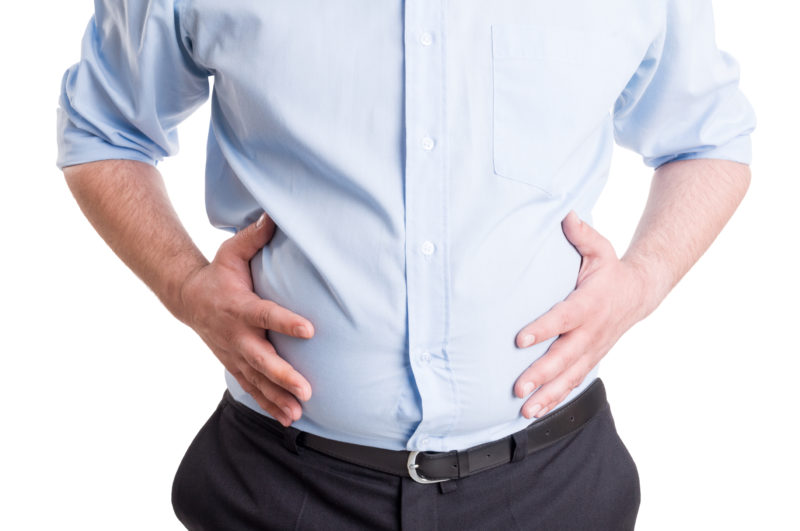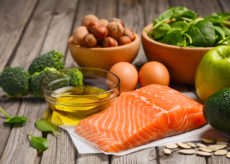Ask the Coaches: What Causes Bloating (and How Can I Fix It)?

Q: Coaches, I have a bit of an embarrassing issue—I can’t seem to beat the bloat. I started eating more healthfully and have been increasing my intake of vegetables (by a lot!). While I thought that would help, I always feel like my belly is distended, and I’m often gassy. It might be my imagination, but it seems to have gotten worse with my healthier eating. It’s so uncomfortable, and I can’t seem to get much relief. What causes bloating, and how can I stop my belly from feeling so swollen?
–Bloated Bertha (not my real name but the nickname I use for my inflated belly…)
A: Thanks, “Bertha,” for your question! You are absolutely not alone as feeling bloated is a common complaint with up to 30% of the population reporting it as a regular experience. Yet, because it is sometimes embarrassing, people tend to keep it to themselves (if possible)—especially if it is accompanied by burps, farts (ah… excuse me…), and a bigger belly, or if it tends to happen a lot.
For what it’s worth, abdominal “bloating” is typically considered a subjective symptom while “distention” of the belly is regarded as an objective sign. In other words, it’s possible to feel bloated without experiencing distention. In fact, some folks struggle with gut “hypersensitivity,” which means that they tend to be more inclined to experience sensations of bloating without noticeable distention.
Perhaps the most common cause of what causes bloating is gas build-up in the intestines, which is often a by-product of intestinal bacteria digesting/fermenting components found in foods (such as fibers, sugar alcohols, and other difficult-to-digest carbohydrates). And it may also result from unknowingly swallowing air. So, not surprisingly, it can be caused or aggravated not only by what you eat but how you eat. For example, it may be caused by:
- Eating too quickly
- Eating too much (or too much of the wrong foods)
- Eating high-fiber foods that tend to cause gas (especially if you rapidly increase consumption)
- Having a food intolerance or allergy (such as eggs, dairy, or wheat)
- Drinking carbonated beverages like soda or seltzer waters
- Drinking alcohol
- Drinking through a straw
- Chewing gum or sucking on hard candies
- Consuming artificial sweeteners
- Swallowing air because of nervousness, stress, or anxiety
While the above causes are fairly benign and can typically be addressed with simple dietary changes, there are more serious conditions to be aware of that may be closely tied to bloating, including:
- Irritable bowel syndrome (IBS), which is often associated with gut hypersensitivity
- Types of Inflammatory bowel disease (Crohn’s, ulcerative colitis, and other forms of IBD)
- Other intestinal disorders, such as small intestinal bacterial overgrowth (SIBO)
- Celiac disease (a serious allergic reaction to gluten)
- Abdominal adhesions that may occur after surgery in the abdominal or pelvic area
- Liver disease
- Hiatal hernias
- Gallstones
- Stomach ulcers
- Gastroparesis
- Constipation or diarrhea
With the above possible causes of bloating, you should work with your personal healthcare provider to help ensure you aren’t suffering from a more serious issue. If your bloating is temporary and fleeting, though, you likely don’t have anything to worry about.
And fortunately, the most common causes of bloating are simple, pretty harmless, and easy to deal with. Of course, we’ll leave those more serious conditions to the healthcare practitioners. In this article, we’ll just focus on how to best address the mostly harmless causes.
Relief for What Causes Bloating
1. Watch Your Food Choices. Your food choices are the most likely culprits for what causes bloating. And while high-fiber foods have bountiful benefits, they may come with side effects (e.g., gas, bloating, and belching), especially if you’re just now getting used to eating them or have recently been increasing your consumption. Here are some of the most common offenders:
- Cruciferous vegetables (like Brussels sprouts, cauliflower, cabbage, and kale), especially when raw
- Fruits like apples, apricots, peaches, and pears
- Beans, lentils, and other legumes (yep, that includes peanut butter)
- Whole grains and whole grain products
- Artificial sweeteners
- Carbonated beverages
- Dairy products
- Processed foods
Your first step then is to identify which foods are causing you to bloat. Do you bloat more after eating out, when consuming fresh, raw vegetables, or after eating fruit? Carry a little journal with you or keep notes on your phone and start jotting down what you’ve eaten when you feel bloated. That way you can start seeing patterns and reduce or eliminate the foods that cause the greatest discomfort. Perhaps you can eat a ¼-cup serving of chickpeas, but if you eat a full cup, your belly gets distended, and you’re surrounded by a noxious cloud. (Go ahead and blame the dog—she’ll still love you.)
Perhaps you find that some fresh fruits are fine, but if you have more than a couple of servings a day, your gut can’t deal. If that’s the case, you may be able to simply decrease the quantity and again increase quantities as your body begins to adjust and is better able to digest the foods. If you suffer after indulging in a feast at your favorite restaurant, then at least you’ll discover the price you’ll pay and you’ll be able to better decide if it’s worth it or if it’s time to find a new favorite.
In addition to watching how you feel when you consume vegetables, experiment with cooked vegetables rather than raw as many people are better able to digest cooked vegetables. Maybe you’re fine with some cooked cauliflower, but when you eat it raw, not so much.
In general, the most probable suspects tend to be difficult-to-digest carbohydrates, such as fiber. For some people, a low-FODMAP diet can be helpful in wiping the slate clean, so to speak.
2. Get Active. Unfortunately, there’s no “beat-the-bloat” guaranteed exercise. However, regular exercise does help support the transit of food and the movement of gas through the digestive system. By regularly moving the body (for example, four to six times a week for at least 30 minutes), you may be able to prevent a buildup of gas and thus help prevent the bloat. In addition, if you’re already suffering from the discomfort of bloating, you can try certain exercises that may help calm your digestive system. Some experts recommend yoga poses like happy baby and child’s pose to provide some relief. Stretches for tight hips, hamstrings, lower back muscles, and glutes may also help. Give these stretches a try. Finally, taking a walk after eating can also support healthy digestion and may help you beat the bloat.
3. De-Stress: Higher stress levels can directly impair digestion by reducing the production of stomach acid, which is essential for complete, timely, and proper digestion. This can leave undigested food particles in the small and large intestines, which then ferment, causing excess gas and bloating. In addition, stressful feelings can affect breathing, and some individuals have been found to swallow more air when anxious or stressed. It can take practice to destress regularly but some simple solutions include becoming more mindful, enjoying nature walks, exercising regularly, meditating, or just taking long, deep breathes throughout the day.
4. Chew Your Food. This can both reduce the amount of air you swallow as you eat and make you eat slower, both of which can help reduce bloating and gas.
5. Cut Back on Sugar and Sugar Alcohols. While staying hydrated helps reduce the bloat, retaining water can bring it on. Along those lines, poorly absorbed carbohydrates, including some sugars (like lactose and fructose), can have an osmotic effect, which simply means they suck up water in the intestines, making you feel more bloated. Simply put, sugary carbs are one of the major factors of what causes bloating.
If you’re looking to cut back on sugar, you might reach for sugar alcohols like xylitol, sorbitol, mannitol, and erythritol, which are often found in sugar-free foods. (Erythritol appears to be better tolerated than some of the other sugar alcohols but can also cause issues when large amounts are consumed.) While these sugar alcohols are generally considered safe in smaller amounts, as you consume more, they are more likely to cause digestive issues, including gas and bloating.1
6. Try Probiotics and Digestive Enzymes. Supporting a healthy balance of gut bacteria by consuming probiotic foods or supplements may help reduce both bloating and gas that’s caused by the abundance of bad bacteria.2,3 And as mentioned, certain types of carbohydrates tend to be the most likely suspects when it comes to belly bloating; along those lines, supplementing with digestive enzymes that are designed to help break down difficult-to-digest carbohydrates (such as lactose, fibers, and other plant-based compounds) may help relieve gas and bloating. While enzymes may have more immediate effects, the benefits of probiotics may take some time to notice. However, there are numerous other benefits, so it’s worth it to be patient.
Other steps to reduce what causes bloating and gas include:
- Eat smaller portion sizes
- Eat more slowly
- Stay hydrated
- Be careful with high-fat meals, which can slow digestion and be problematic for folks who are prone to bloating
- Avoid carbonated beverages, which can cause a build up of carbon dioxide in the stomach
- Stop using straws, chewing gum, or sucking on candies to avoid swallowing air
- Don’t smoke
- Try drinking peppermint, ginger, or chamomile tea
What Causes Bloating: A Recap
You may not find an immediate solution to bloating and gas, but with some effort, personal curiosity, and investigation, you can likely find the relief you’re looking for. If you’re still experiencing gas and bloating, you may want to consider a low FODMAP diet as well as seek help from a functional nutritionist or healthcare professional.
Please let us know if we were able to help you say goodbye to “Bertha” (at least most of the time).







